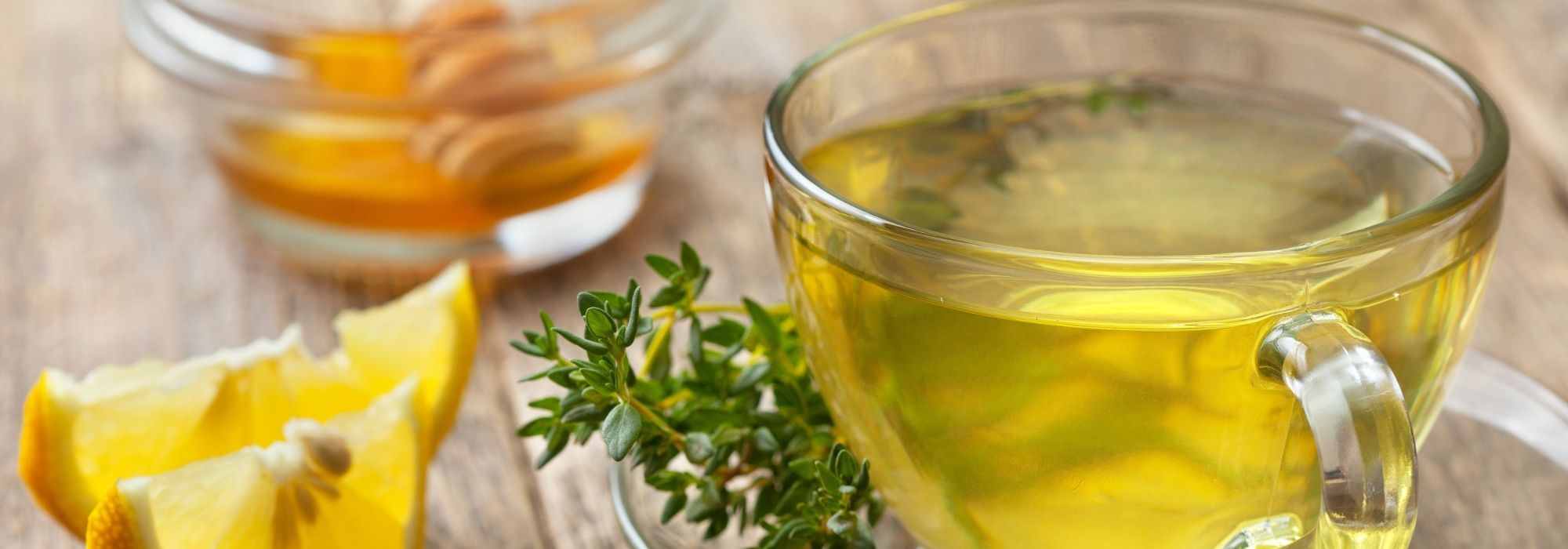
5 Plants to boost the immune system
Easy-to-grow plants at home for making herbal teas
Contents
Our immune system helps us better fight off temporary infections and external aggressions. A good diet, regular physical activity, quality sleep, and reduced stress can strengthen it on a daily basis. However, certain plants are also renowned for their natural immunostimulant properties.
In infusions or decoctions, their properties may support, or even boost, immunity and the body.
Discover our selection of 5 plants to help your natural defenses, easy to grow at home in pots or in the ground.
Of course, do not hesitate to seek advice from a healthcare professional if you have any doubts about using a plant or have medical history.
Thyme
The thyme, also known as “farigoule” in the South of France, is one of the most popular and widely used herbs in cooking to flavour dishes.
This perennial undershrub is also reputed to have medicinal properties. In herbal medicine, it is used among other things as a natural defence stimulant, antiviral, and antiseptic for the respiratory system. These virtues are thought to stem from its richness in trace elements and vitamins, which have been praised since antiquity.
The fresh or dried leaves and stems of thyme can be consumed as an infusion, for example, accompanied by a slice of lemon and a teaspoon of honey. A true drink to boost and warm the body, especially in winter!
Thyme is easy to grow, whether in the ground or in a pot. Provide it with poor, light, and well-drained soil in a sunny position.
For further reading, check our detailed sheet “Thyme: how to grow, plant, and prune” and our advice sheet “How to grow thyme in a pot?”.
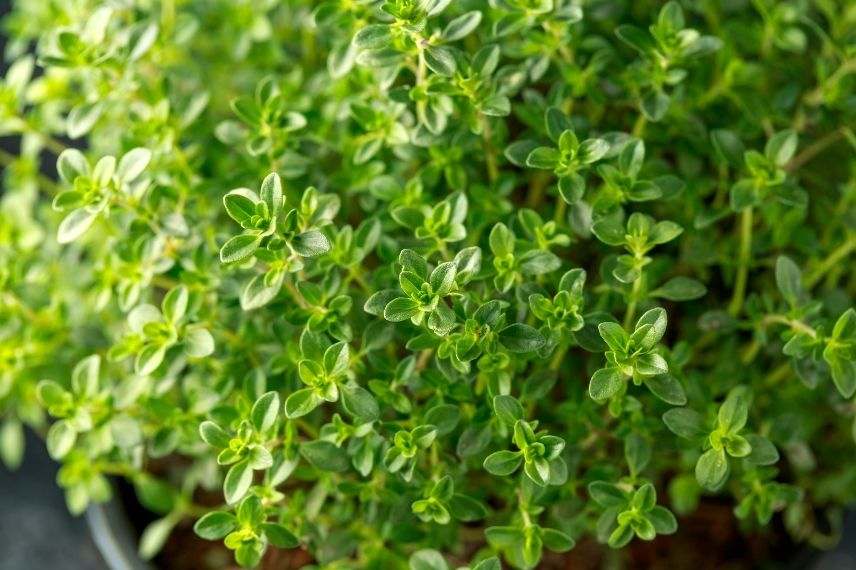
Thymus vulgaris
Cypress
The cypress is part of the conifer family and includes dozens of different species, each with varying requirements and aesthetic qualities. They feature a very distinctive fragrant evergreen foliage.
It is their fruits (walnuts) that are particularly sought after in pharmacopoeia for their therapeutic use. They are believed to have powerful antiviral and immune-boosting properties. In aromatherapy, it is the essential oil of the evergreen cypress that is valued.
The crushed walnuts can be used in herbal teas, infusions, or decoctions. They are also used in fumigation to purify the air in a room.
Due to their large silhouettes, which can reach nearly 20 metres in height, cypresses are best suited for large spaces. However, there are more modest varieties, such as the creeping Siberian cypress (40 cm in height with a spread of 2 metres after a few years), which can be grown in small gardens or even in large pots.
Unfussy, the cypress only requires a sunny, even dry, location in well-drained soil, including calcareous soil.
For further reading, discover our detailed sheet “Cypress, cupressus: planting, pruning, and care.”
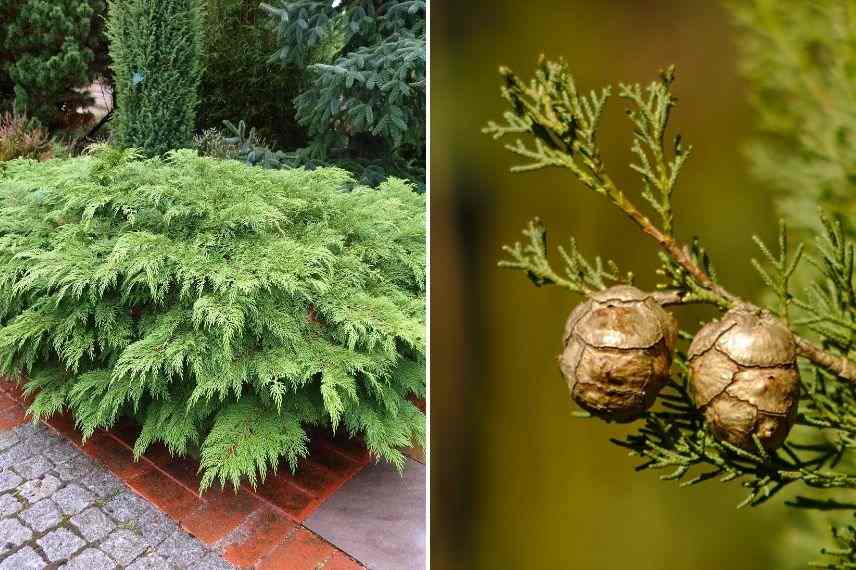
On the left, Creeping Siberian Cypress (Microbiota decussata); on the right, cypress walnuts
Echinacea
Theechinacea or rudbeckia is a delightful, colourful flower reminiscent of a daisy, brightening up the entire summer season.
This perennial is valued in homeopathy and phytotherapy for its benefits. This plant, native to North America, was already consumed by Native Americans to relieve various ailments. Its root and aerial parts are believed to help tone the immune system, strengthen the body, and combat infections.
The dried plant is typically used in herbal tea, while the root is consumed as a decoction to extract the maximum active ingredients.
Easy to grow in pots or in garden beds, echinaceas require only a sunny location and well-drained soil.
For further reading, check out our dedicated article “Echinaceas: sowing, cultivation, and maintenance.”
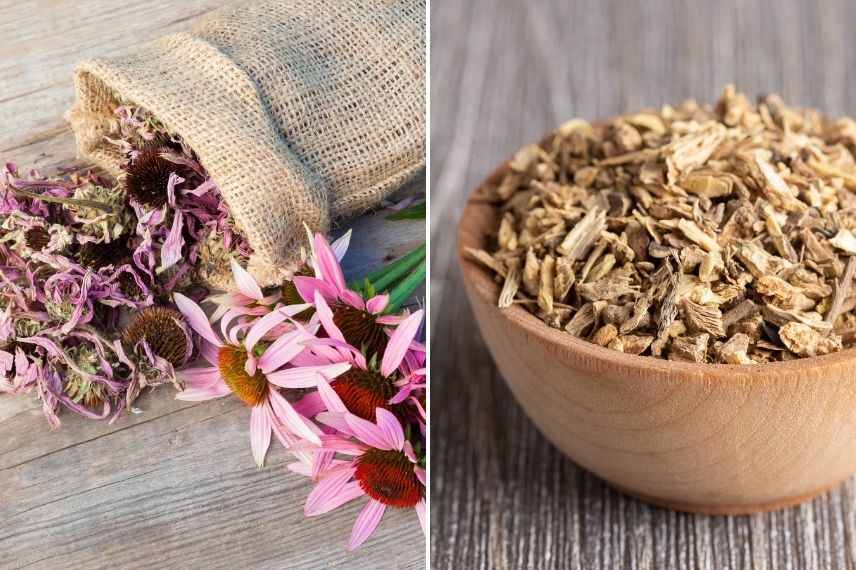
On the left, dried echinacea flowers; on the right, dried echinacea root
Sage
The scientific name of the sage comes from the Latin Salvare, which translates to “save” or “heal”, highlighting its renowned properties for millennia! These plants are valued in the garden for their long, colourful flowerings and their decorative, textured leaves.
Sage is used in cooking to enhance dishes with its leaves or even its flowers, which have a characteristic camphor-like aroma.
The virtues attributed to sage make it a medicinal plant, cultivated since the Middle Ages. The common sage and clary sage are the varieties valued in phytotherapy and herbalism. They are used for their regulatory properties on the female hormonal system, as well as for their reputation as a natural antiseptic, wound healer, and digestive tonic. Sage is also associated with a high concentration of antioxidants, vitamins, and minerals, along with a beneficial effect on the immune system.
The leaves and stems are consumed fresh or dried in infusions. Sage wine or sage liqueur are also said to be used for their digestive virtues.
Robust and easy to cultivate, sages will thrive in full sun in well-drained soil. They will do well both in pots and in the ground.
For further reading, check out our complete guide “Sages, Salvia: planting, pruning, maintenance”.
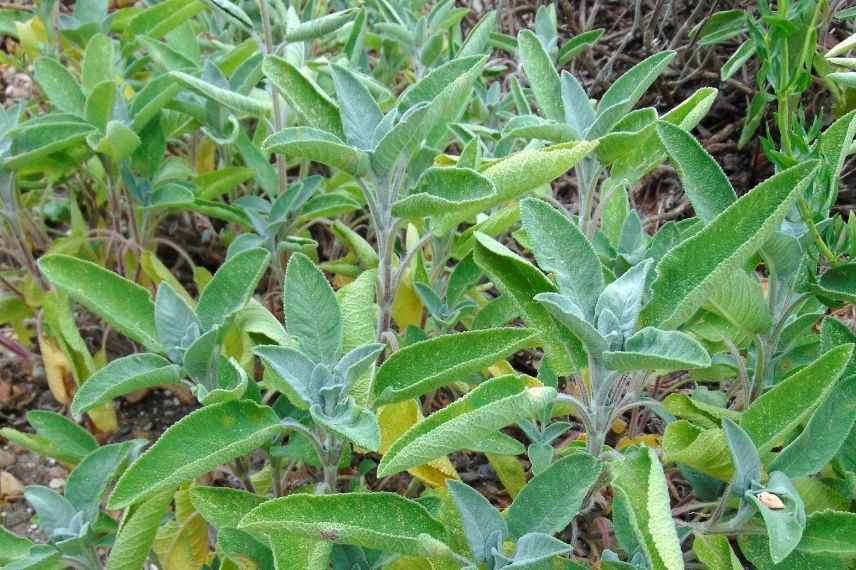
Salvia officinalis
Elderberry
The black elder is a large deciduous bush, valued for its many aesthetic qualities: dense foliage, beautiful and abundant flowering with fragrant white umbels, and decorative yet edible fruit after cooking.
It is also renowned for its natural health benefits. In traditional pharmacopoeia, flowers, leaves, and bark are used for their medicinal properties. It is attributed with diaphoretic (helping to sweat and reduce fever), diuretic, antiviral, and anti-inflammatory virtues. The black elder is said to support the immune system.
It is mainly the flowers that are used in herbal tea. Their sweet taste makes for a refreshing drink that is ideal for the palate and the body. The berries, with their sweet and floral flavour, can be used in syrup or juice once cooked. These fruits are known for their richness in vitamins and amino acids.
The black elder reaches about 6 metres in height and width at maturity and can even become invasive. It is therefore best grown in larger gardens. Hardy and tolerant, it poses no particular difficulties, thriving in all types of soil, in sunny or partially shaded locations.
For further reading, check out our dedicated article “Elder: planting, growing, pruning.”
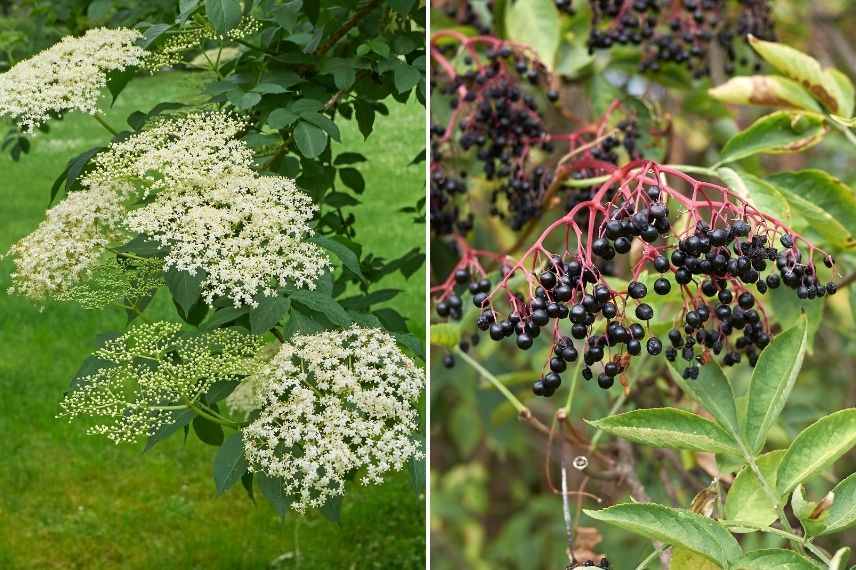
Flowers and berries of black elder (Sambucus nigra)
- Subscribe!
- Contents
































Comments